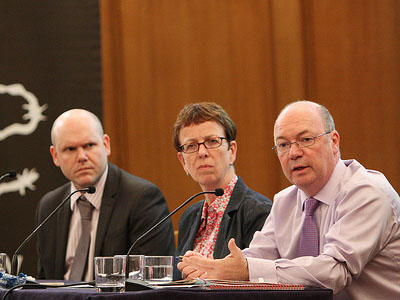It is estimated that 750,000 people are killed each year in armed violence. Millions more lives are blighted through injury, displacement and destroyed livelihoods. Much effort in multilateral negotiation goes in to the control and regulation of weapons of mass destruction. But, in fact, it is the so-called small and conventional arms that are the mass killers, fuelled by the unregulated trade in conventional weapons. While it is unrealistic to believe that we can have a world without weapons, we can help protect human life by controlling and regulating the international arms trade.
Which is why, back in February, the UK and the Holy See agreed that we would: “share a commitment to work at the United Nations and other fora to strengthen the international focus on conflict prevention, disarmament, arms control and non proliferation, aimed at protecting human life and building a world more respectful of human dignity. As part of this effort, we look forward to positive outcomes in July to the final negotiations to agree upon a robust Arms Trade Treaty with a wide scope..”.
Throughout this month, negotiations are underway at the UN in New York to achieve just that. The United Kingdom is committed to securing a robust, effective and legally-binding Arms Trade Treaty, to stop weapons getting into the hands of those who would abuse human rights, harm development and undermine stability and democracy. We are under no illusion that securing it will be anything other than difficult. There are complicated commercial interests involved and different national laws to take into account.
That is why our collaboration with the Holy See will be crucial. We agree on the outcome we want to see. But while the UK will concentrate over the next few weeks on the technical “how” of bringing an ATT to conclusion, the Holy See will constantly remind negotiators of “why” – the moral arguments in favour of ambitious agreement. While we and our original co-sponsors of the UN ATT Resolution – Argentina, Australia, Costa Rica, Kenya, Finland and Japan – are likely to be looking closely at the supply of weapons, the Holy See will want to address the demand, looking at how to promote a stronger culture of justice and peace, away from violence and criminality.
The ATT negotiations are a good example of where the Holy See and the UK can work together in a complementary way, for the common good. Now is the time for us to deliver.

